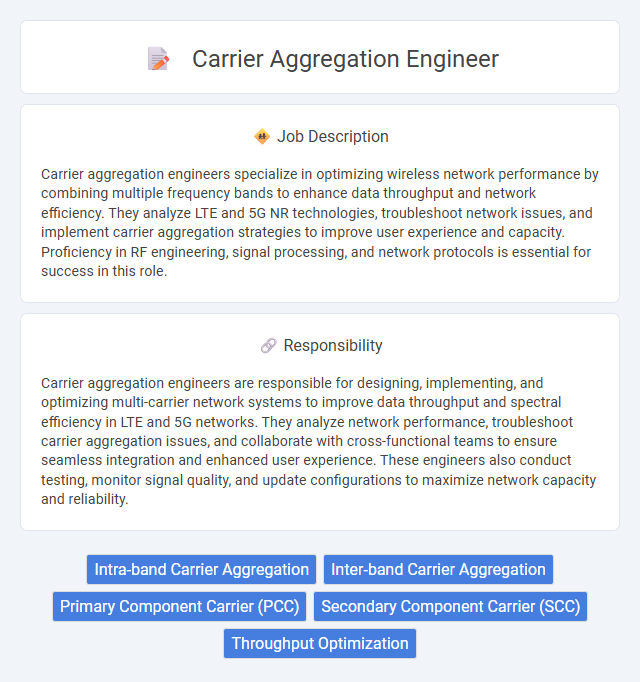
Carrier aggregation engineers specialize in optimizing wireless network performance by combining multiple frequency bands to enhance data throughput and network efficiency. They analyze LTE and 5G NR technologies, troubleshoot network issues, and implement carrier aggregation strategies to improve user experience and capacity. Proficiency in RF engineering, signal processing, and network protocols is essential for success in this role.
Individuals with strong analytical skills and a solid understanding of wireless communication technologies are likely to excel as Carrier Aggregation Engineers. Those comfortable working with complex network optimization and troubleshooting may find this role well-suited to their strengths. Candidates who thrive in fast-paced environments and adapt quickly to evolving technology trends could be particularly compatible with these job demands.
Qualification
A Carrier Aggregation Engineer requires expertise in LTE and 5G NR technologies, with a strong understanding of RF propagation, spectrum management, and network optimization techniques. Proficiency in tools such as TEMS, Atoll, and MATLAB is essential for analyzing and improving carrier aggregation performance. A background in telecommunications engineering, complemented by experience in drive testing, troubleshooting, and KPI monitoring, ensures effective deployment and maintenance of multi-carrier networks.
Responsibility
Carrier aggregation engineers are responsible for designing, implementing, and optimizing multi-carrier network systems to improve data throughput and spectral efficiency in LTE and 5G networks. They analyze network performance, troubleshoot carrier aggregation issues, and collaborate with cross-functional teams to ensure seamless integration and enhanced user experience. These engineers also conduct testing, monitor signal quality, and update configurations to maximize network capacity and reliability.
Benefit
Carrier aggregation engineers likely enhance network capacity and speed by combining multiple frequency bands, improving overall user experience. They may contribute to more efficient spectrum utilization, potentially reducing operational costs for service providers. This role probably offers opportunities for skill development in advanced wireless technologies and competitive salary prospects.
Challenge
Carrier aggregation engineers likely encounter complex challenges related to optimizing network performance across multiple frequency bands. The role probably requires addressing interference issues and ensuring seamless integration of aggregated carriers to enhance data throughput. Managing evolving standards and coordinating with hardware and software teams might also pose significant difficulties.
Career Advancement
Carrier aggregation engineers specialize in enhancing wireless communication systems by combining multiple frequency bands to increase data throughput and network capacity. Expertise in carrier aggregation techniques, LTE, and 5G NR technologies significantly boosts career prospects within telecommunications companies and network equipment providers. Advancing to senior roles involves gaining proficiency in network optimization, radio access networks, and project management, offering opportunities for leadership positions and strategic development roles.
Key Terms
Intra-band Carrier Aggregation
An Intra-band Carrier Aggregation engineer specializes in optimizing wireless network capacity by combining multiple frequency blocks within the same LTE band, enhancing data throughput and spectral efficiency. Expertise in configuring LTE physical layer parameters, managing component carriers, and troubleshooting carrier aggregation-related issues is critical for maximizing network performance. Proficiency with RF planning tools and deep understanding of 3GPP standards related to intra-band CA support ensures seamless integration and improved user experience.
Inter-band Carrier Aggregation
Carrier aggregation engineers specializing in Inter-band Carrier Aggregation design and optimize multi-band wireless systems to enhance network capacity and data throughput. They analyze frequency band compatibility, coordinate inter-band signaling, and develop algorithms to efficiently combine disparate spectrum bands in LTE and 5G networks. Proficiency in RF propagation, network simulation tools, and standards like 3GPP is critical for minimizing interference and maximizing spectral efficiency.
Primary Component Carrier (PCC)
A Carrier Aggregation Engineer specializing in Primary Component Carrier (PCC) optimizes network performance by managing the primary data flow in LTE and 5G systems. The PCC serves as the main anchor providing essential control signaling and initial connection setup while coordinating with secondary carriers to maximize bandwidth and throughput. Expertise in configuring and troubleshooting PCC parameters ensures seamless integration and enhances overall spectral efficiency in multi-carrier deployments.
Secondary Component Carrier (SCC)
A Carrier Aggregation Engineer specializing in Secondary Component Carrier (SCC) manages the integration and optimization of multiple LTE or 5G carriers to enhance network capacity and data throughput. The engineer configures SCC parameters, monitors inter-band and intra-band aggregation, and ensures seamless coordination between primary and secondary carriers to maximize spectral efficiency. Expertise in SCC scheduling, interference mitigation, and handover processes is essential for maintaining robust and high-performance mobile communication systems.
Throughput Optimization
A Carrier Aggregation Engineer specializes in maximizing mobile network throughput by integrating multiple frequency bands to increase bandwidth and data rates. Expertise in LTE and 5G NR technologies enables effective management of aggregated carriers to reduce latency and enhance user experience. Proficiency in performance analysis tools and RF optimization techniques ensures continuous throughput improvement and network capacity expansion.
 kuljobs.com
kuljobs.com